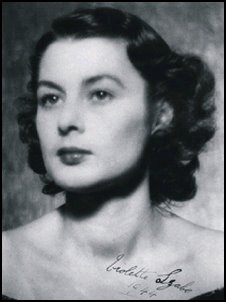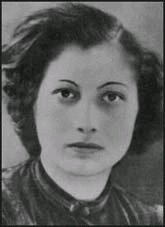
Posted on 02/21/2006 11:31:34 AM PST by 68skylark
Despite the fact that they are probably the most described artifacts of 20th century, very little is known about how individuals died in Third Reich's concentration camps. This article tries to follow the fate of British women SOE agents who were executed within the concentration camp system. It's a little surprising to learn that British intelligence never officially bothered to find out. Discovering their fate became the private crusade of Vera Atkins, who was assistant to the head of the French Section of the SOE. And the answer after 60 years is that nobody really knows. One of the reasons perhaps, was that nobody wanted to know. Failure, no less than the dead, were buried after the war. SOE cryptographer Leo Marks, the son of a Jewish bookseller, believed the agency's codes were fundamentally unsafe and tried to convince his superiors to adopt a one-time code pad system. But his warnings were ignored and the SOE continued to drop agents, many of them women, into occupied Europe where too many of them were arrested, sometimes upon landing.

Since the British believed that women could more easily slip unnoticed through the Continental streets, they concentrated on recruiting dark haired women who could pass for French. One of them was Violette Szabo of French and English extraction.

Another was a Sufi Muslim Princess, Noor Inayat Khan. Her father was a mystic and she was one herself. "After studying music and medicine Noor became a writer. Her children stories were published in Figaro and a collection of traditional Indian stories, Twenty Jataka Tales, appeared in 1939."

Szabo's official fate is given in Wikipedia.
She was captured by German soldiers, most likely from the 1st battalion of the Deutschland regiment, around mid-day on the 10th of June, 1944, near Salon-la-Tour, while they were searching for one of their missing officers. In R.J. Minney's biography of her, she is described as putting up fierce resistance with her Sten gun. German documents of the incident record no injuries or casualties to German soldiers. She was transferred to the SD in Limoges. She was interrogated under torture, then sent to Ravensbrück concentration camp where she was forced into hard labour and suffered terribly from malnutrition and exhaustion. Violette Szabo was executed by the Germans on or about February 5, 1945 and her body disposed of in the crematorium. At Ravensbrück, three other female members of the SOE were executed by the Germans: Denise Bloch, Cecily Lefort, and Lilian Rolfe.
Noor Inayat Khan was arrested four months after landing. She was executed at Dachau.
The princess was taken to Germany and imprisoned at Pforzheim in solitary confinement (she was considered dangerous and uncooperative). Inayat Khan continued to refuse to give any information on her work or her fellow operatives. On 11 September 1944, Noor Inayat Khan, along with three other SOE agents, Yolande Beekman, Eliane Plewman and Madeleine Damerment, were moved to Dachau Concentration Camp. The other three women were lined up and forced to kneel, after which each was executed by a single shot to the head. Noor was shackled in chains for months and beaten until she was a bloody mess and then shot. Her last word was "Liberté"
Although it cannot be said for sure, Khan's place of execution is held to be at the pistol range in Dachau. "The traditional method of execution was a shot in the neck at close range, which was the method used by the Nazis to kill traitors, spies, saboteurs and resistance fighters at a pistol range in front of a wall north of the crematorium. ... A ditch was dug about six feet from the execution wall to catch the flow of blood." A picture of the blood ditch is shown below as it appears today.

Leo Marks, as a Jew, felt himself no less an outsider than these dark-haired, expendable women. He tried long, and finally successfully, to get his SOE superiors to discard their amateurish practice of enciphering agent messages using transpositions based on well known ('the easier to memorize, Old Boy') English poems -- systems Marks could break with ease. When the SOE balked at one time pads he insisted that if agents were going to use poem codes, they ought at least to be original. The code-poem he wrote and gave to Violette Szabo on her wartime mission is a memorial to a time when a Muslim, Christian and Jew could find it in their hearts to fight Hitler with one word upon their lips: Liberte.
The life that I have
Is all that I have
And the life that I have
Is yoursThe love that I have
Of the life that I have
Is yours and yours and yours.A sleep I shall have
A rest I shall have
Yet death will be but a pause
For the peace of my years
In the long green grass
Will be yours and yours and yours.
If you believe in moral absolutes and know that there is a difference between good and evil, the answer is most certainly YES.
"If you believe in moral absolutes and know that there is a difference between good and evil, the answer is most certainly YES"
--- Whose set of moral absolutes is more important?
It can be demonstrated that Western Civ's moral absolutes include a high value on life, even of our enemies.
It can also be demonstrated that the terrorists moral absolutes do not include this high value, at least with respect to their enemies.
How do you "prove" which set of moral absolutes is correct?
Especially since both as reverenced as being direct from that cultures diety.
"We hold these truths to be self-evident"---to anyone with a conscience.
I do not think that a "proof" can be derived like a mathematical theorem, if that is what you are looking for. There is really only one moral culture whose values have withstood the test of millennia.
Now I'm concerned about what they're teaching you in school. But since you ask, let me try to provide a serious response. I don't know if you'lll agree with me or not.
If a criminal bust into your home at night with the intention of killing you and your family (or worse), are you morally justified to defend yourself with force and kill him first?
A real pacifists would say "no," I guess, even if it leads to harm to himself AND to others who can't defend themselves effectively (kids, elderly, etc.).
But I think any sane person would say, "of course -- obviously it's okay."
A very similar thought process says it was right to use armed force to stop Nazi Germany in WWII.
The use of spies and saboteurs, along with a whole range of other intelligence-gathering and irregular warfare activities, are a normal part of war.
"Question stands, is there a moral & ethical difference between someone who is doing good (under their belief system) by doing harm to you; vs you when you (under your belief system) are the good guy."
I would say that there is an objective standard, yes: you instigates the deadly violence first.
Call this the "rule of tit-for-tat". If I don't hurt you, you don't hurt me. If I don't yell at you, you don't yell at me. If I DO yell at you, then the morally equivalent action is for you to yell back.
So, what is the difference in the two positions?
The difference is who instigated the yelling, or the violence, or the murder, or the war.
WHY is that a difference?
You tell me. Why is it wrong for me to walk up and bash you in the face, or to just up and stick a knife in your guts?
Presumably you think that's wrong, but WHY?
It is perhaps simply definitional: it's wrong to instigate violence because we say so, and this is something on which most people, everywhere, agree.
In that context, what's the difference between the English sending in spies and the Germans doing the same thing? Easy. The Germans started a war of aggressive conquest.
Why? Because they wanted to. Was it to bring some sort of good to the conquered? No, it was to enslave them. They attacked. Therefore, it's ok to attack them back.
There's your answer.
---------------------------
Screename ping.
If you feel like it, you might give it a read. I think it touches on a question that's pretty similar to the one you've raised. It's called Non-Judgment Day at Yale.
When Michael Kelley was killed in Iraq I was really stunned -- he can never be replaced.
I thought the military term was "Summary Execution".
A relative.
'Marks wrote an interesting book (though not a particularly exciting one, it is cryptography after all) on his wartime experiences called "Between Silk and Cyanide."'
I started the book with great excitement (Marks has always been a hero of mine), but was bored to death by it. It wasn't the story which bothered me so much as the turgid prose.
By the way, in case you weren't aware (I'm not sure that the book mentions it), Marks' father was the bookseller from the famous book by Helen Hanff, 84 Charing Cross Road:
http://www.amazon.com/gp/product/0140143505/103-3117042-7275030?v=glance&n=283155
Which was made in to a movie:
http://www.imdb.com/title/tt0090570/

That's a really beautiful photo -- thanks.
Thanks for the background. I don't think I've heard about her until I read your post.
I just finished John Keegan's book on The Second World War, and he makes essentially the same point you do -- for all the super-human bravery of the people involved with this work, it was mostly difficult or impossible to operate in Nazi-occupied Europe. Many operatives were parachuted in to Germans who were waiting for them when they landed, because the clandestine groups had been so thoroughly penetrated.
The British were able to do something similar in England -- the Nazis thought they had operatives in the UK, but all of them had been discovered, and the "information" they provided was bogus.
Keegan says the far less glamorous work of the chairborne cryptoanalyst, who could break codes, had a far great impact on the war.
The msot exciting action superspy Kim Philby ever accomplished was sneaking out of England before he was arrested.
For others involved in intelligence-gathering and espionage, I'm sure you're right about the work being 99.99% boring and painstaking.
And by the way, welcome to FR.
Disclaimer: Opinions posted on Free Republic are those of the individual posters and do not necessarily represent the opinion of Free Republic or its management. All materials posted herein are protected by copyright law and the exemption for fair use of copyrighted works.